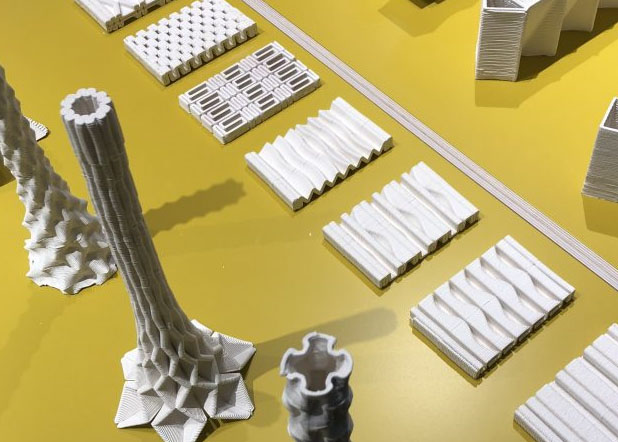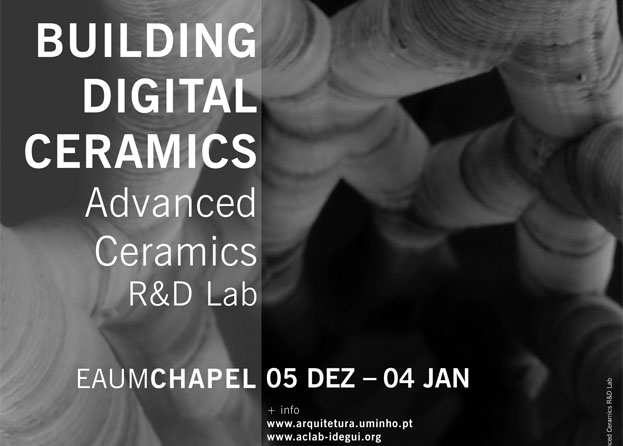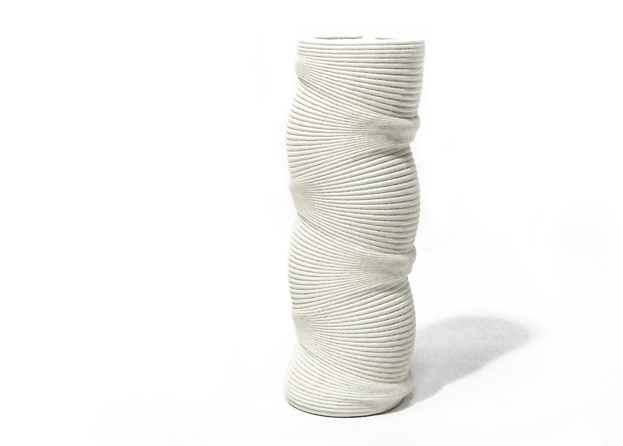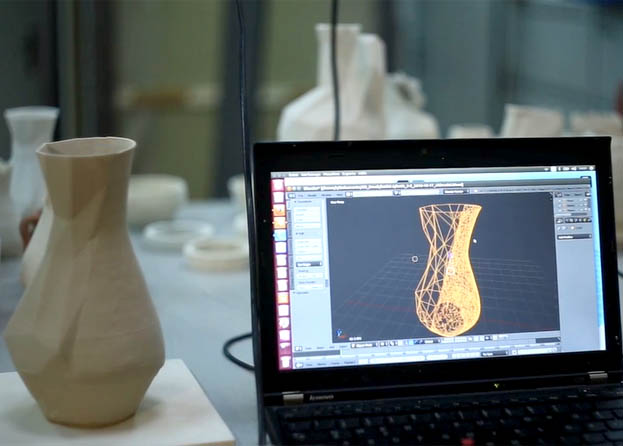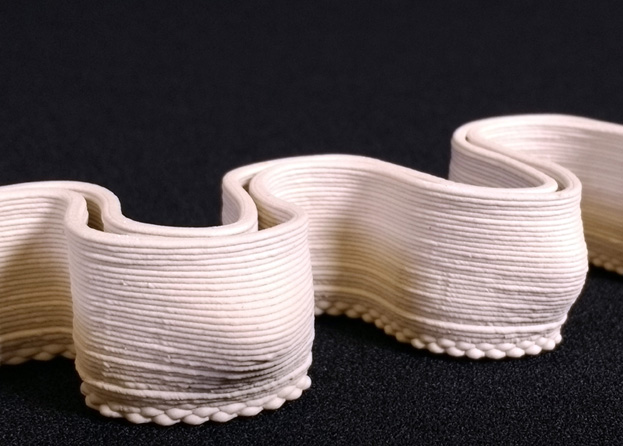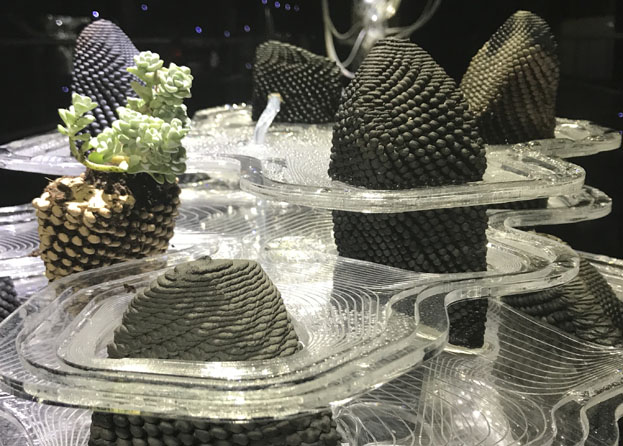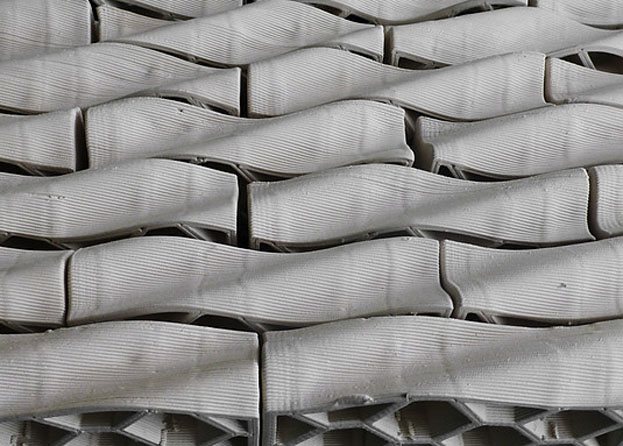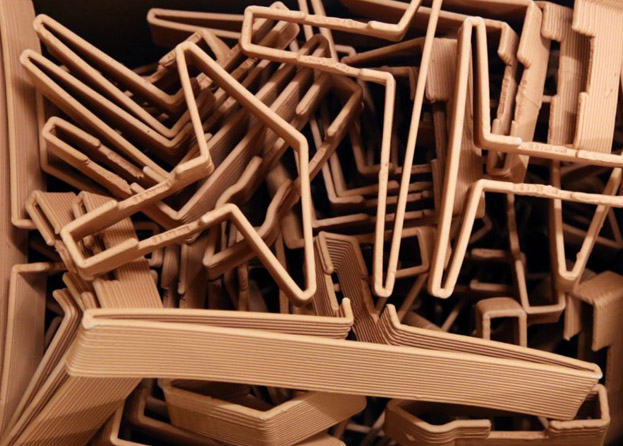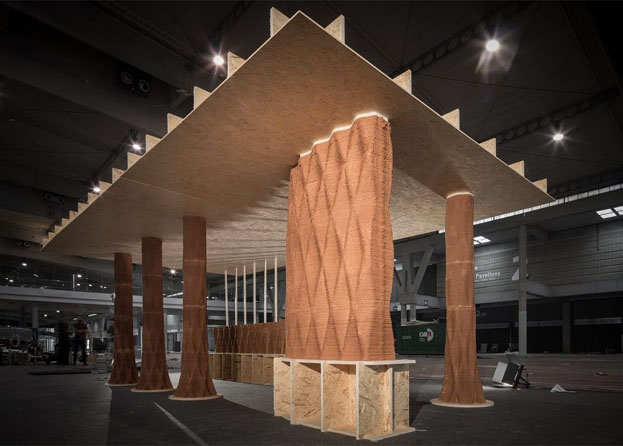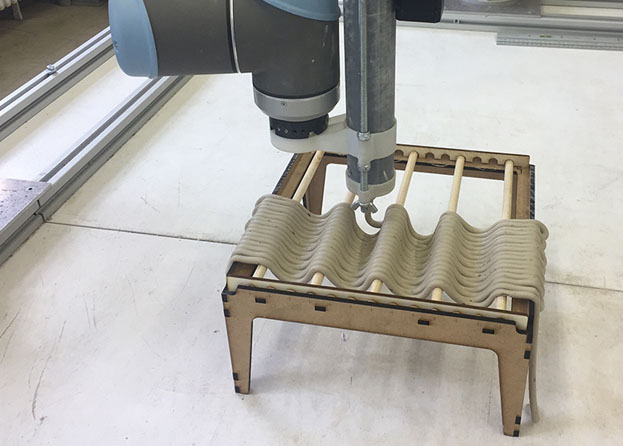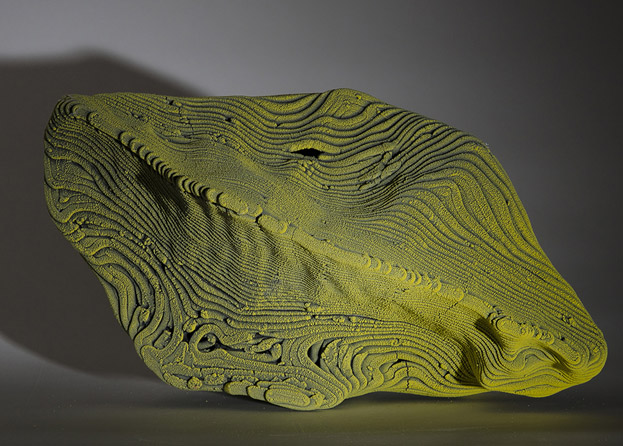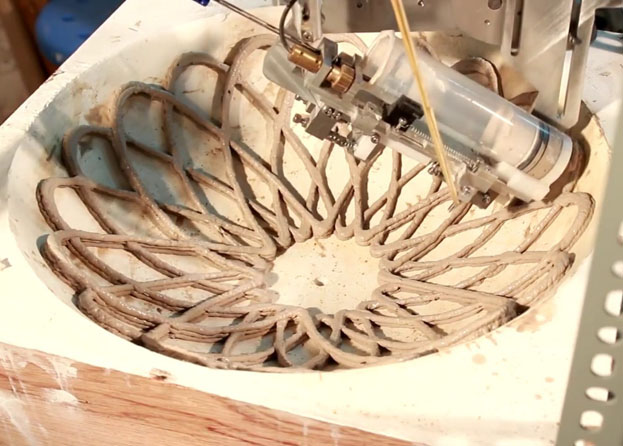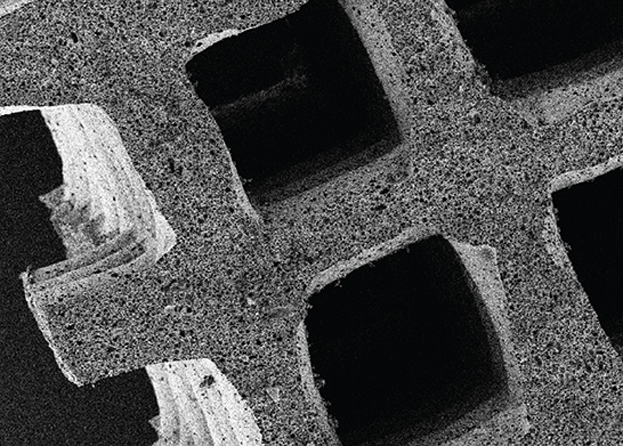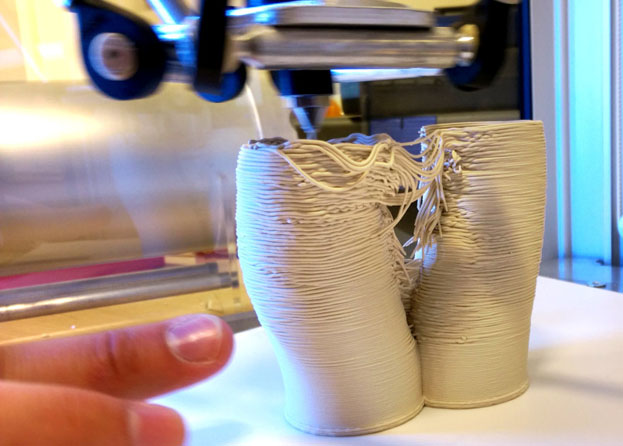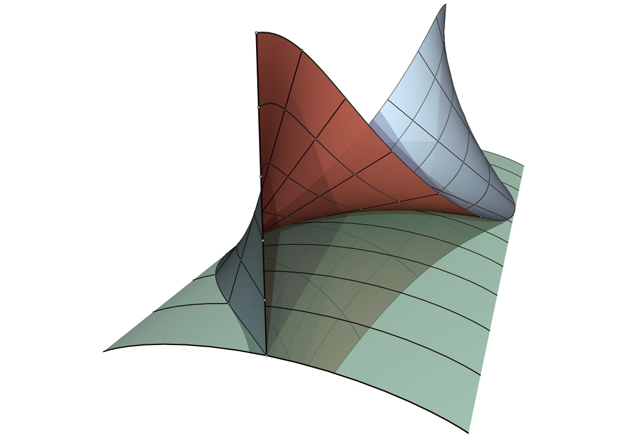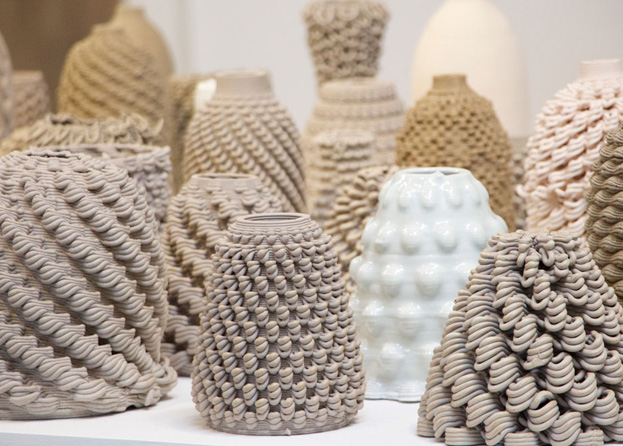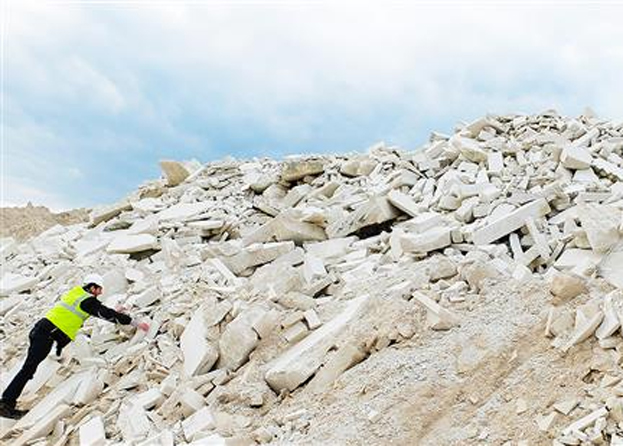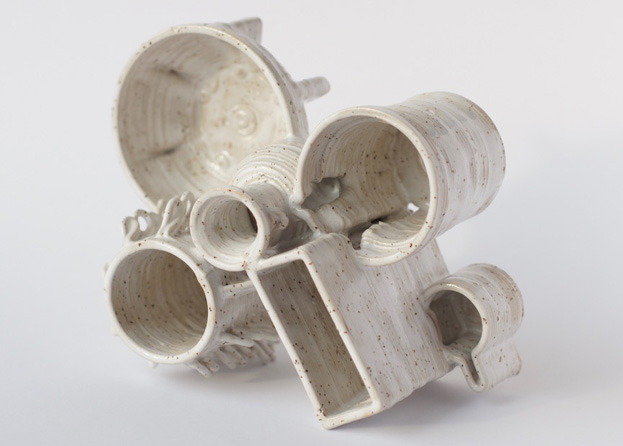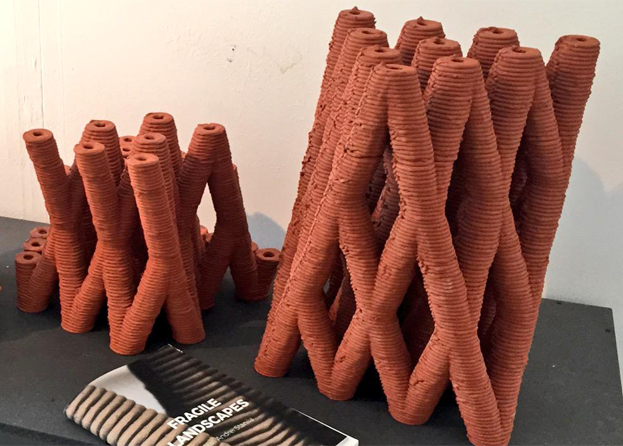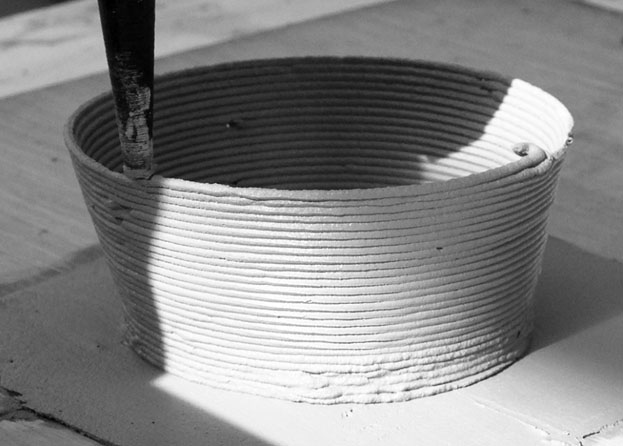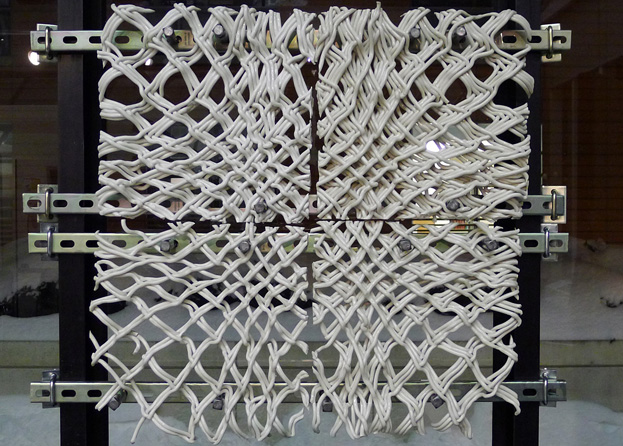Editorial: Studio Sven pfeifferfArchitecture,BerlinBy: Admin, Studio Sven Pfeiffer The installation PRINTED TOWER in the new museum FUTURIUM in Berlin investigates the use of innovative manufacturing methods for the production of complex architectures and new methods for the interaction between man and machine. In an additive manufacturing process, individual components are produced from a biodegradable and […]
research
Building Digital Ceramics
Editorial: Minho School of Architecture, PortugalBy: Admin, AC Lab MinhoImages provided by Paulo Cruz. ‘Building Digital Ceramics’ exhibits a set of elements developed in the Advanced Ceramics R&D Lab of Minho School of Architecture between 2016 and 2018. The elements where developed with the aim of exploring the integration of computational tools and additive manufacturing processes in […]
Robotically 3d printed clay bodies
Author: DigifabTuring Edited by: Marlieke Wijnakker Co-de-iT cluster focuses on computational design, digital fabrication, robotic automation and material research, for the development of applications in the fields of Architecture, Design and Art. Co-de-iT is presenting a selection of robotically 3d printed clay bodies, designed and produced inside the digifabTURINg initiative. The pieces represent instantiations of […]
Porcelain from the printer: tradition meets disruption
By: Yao van den Heerik Project Sponsored by PHASE XI Germany PHASE XI is a project from the Competence Center for the Cultural and Creative Industries of the Federal Government of Germany within the framework of the Cultural and Creative Industries Initiative and is funded by the Ministry of Economic Affairs and Energy. The […]
FUTURE HERITAGE, The Constitute
Edit: Yao van den Heerik The Constitute is a Berlin based agency founded by Sebatinan Piatza and Christian Zöllner They constitute units precisely selected on the expertise that is necessary to run a project. They work like this in their own artistic projects as well as in commissioned works. They teach, give workshops,and create and share […]
3d Clay printing at Nottingham Trent University
Author: Dana Church | Innovation Consultant at Nottingham Trent University, England, UK. Using a LUTUM XL machine The ‘design hub’ of Enabling Innovation programme at Nottingham Trent University operates as a design consultancy providing local SME businesses access to disruptive digital technologies applied to design and processes, including 3D visualisation and rapid prototyping (including 3D […]
SEEM[N]EST by Studio UnSeen, Estonia.
Authors: Studio UnSeen Ljudmilla, Georgijeva, Tiia Vahula, Madis Kaasik Coauthors: Newcastle University Experimental Architecture Group. Studio UnSeen is a Tallinn based design practice that explores robotic manufacturing methods and their implementation in contemporary architecture, interior and product design. Their current focus is on experimenting with 3D printed ceramics, working at the crossroads […]
ADVANCED CERAMICS R&D LAB at the Design Institute of Guimarães
Author: Paulo Cruz, Bruno Figueiredo The Advanced Ceramics R&D Lab is an emerging laboratory, found in 2016 and based in the Design Institute of Guimarães, Portugal, which aims to explore the integration of digital additive manufacturing techniques in the architectural design and production processes of ceramic elements for building envelopes. The advent of ceramic 3D printing brought […]
architectural twisted at Hong Kong University
A team of researchers and students from the HKU Faculty of Architecture working with Holger Kehne from Plasma Studio making a architectural twisted tower out of 2,000 3D-printed terracotta blocks. Every clay block used to build the Ceramic Constellation Pavilion was individually printed in a unique shape and size robotic technology. The team used about […]
IAAC Demonstrates Robotics 3D Clay Printing in Barcelona
A project by the Institute for Advanced Architecture of Catalonia and Tecnalia brings 3D printing to the Construmat fair 2017 in Barcelona. During the course of the fair, the pavilion was 3D printed on-site. PYLOS website
TUB: Hello Robot
Directed by: Prof. Matthias Karch with Nicolai Schlapps Researcher: Magnus Menze ROBOTIC DESIGN LAB | Master Research Project | Hello Robot Technische Universität Braunschweig This project explores the possibilities of using parametric programming and the robot to create shapes, objects and surfaces in clay and ceramic that contradict the industrial standard of a perfectly replicated […]
3D sculptures in Karlstad
Source, pictures and writing: Magnus Hermansson, Nyheterna P4 Värmland Translation googletranslate, final edit, Yao vd Heerik 3D printed sculptures are exhibited in Karlstad An unusual art combination was presented at the exhibition Clay Coherences in Karlstad, where modern digital technology meets ceramics. It’s about sculptures printed with 3D printers. “The aim is to acquire new tools and […]
Gravity powered, The Z-machine !
Z Machine is a fully mechanical Clay 3D Printer, powered by 20 kilograms of weight. The printer, driven by chains and gears, works as a geometry calculator that prints out an unlimited amount of geometric shapes. The printed clay can then be glazed and fired to become a piece of elegant Crafts.
ETH ZUrich: Ceramics 3D printed from foams
An electron microscope reveals the fine structure of the 3D-printed ceramic foam. (Image: from Minas et al, 2016, Adv. Materials) ETH researchers have used an additive manufacturing process to print an extremely porous ceramic component. Manufacturing a material of this kind with a 3D printer is a considerable achievement. By: Peter Rüegg Doctoral student Carla […]
Living Prototypes, AHO’s AM research
Digital Clay Fabrication – initial trials with the WASP Deltabot by: William Kempton, The PhD research project, a part of AHO’s continued involvement in research on Additive Manufacturing (AM), aims to investigate the possibilities of Additive Manufacturing, popularly labelled 3D printing, in the field of Product Design. Clay is a mineral which can be shaped and formed […]
Matter Meddles with Math
Author : Matthias Weber in colaboration with, Malcolm Mobutu Smith. Word from the editor: Matter Meddles with Math was part of a project at Indiana University (Bloomington) with the name “(Re)Imagining Science”, where artists and scientists would collaborate on artistic rendering of scientific objects. The outcome was a small exhibit with works from eight teams, […]
Emerging Objects: GCODE.Clay
By Ronald Rael GCODE.Clay is a series of objects 3D printed in various clays (porcelain, bmix, terra-cotta, and recycled clay) that explore the creative potential of designing with G-code, the language in which people tell computerized machine tools how to make something. In this case the 3D printer is pushed outside the boundaries of what […]
Repurposing Portland stone waste
Author: Marlieke Wijnakker Novi Limestone Printer Instead of creating more waste we have to come up with ideas to diminish the existing pile. Quarrying is an inefficient process with most of the waste created going into aggregates. In an effort to sustainably deal with this high amount of valuable limestone waste, Jack Biltcliffe, in collaboration […]
Steffen Hartwig
From: steffenhartwig.de Today 3D printers are omnipresent. But most of the time they are used to print objects that already exist and to force any material into any shape. That reminds of the arrival of new technologies in the past. When it became possible to build with cast iron in the end of the 19th […]
X bricks, Grymsdyke Farm, Vitali Stanila
X-Bricks, Clay Robotics 3D printing from Vitali Stanila on Vimeo.
Clay 3D Printing with Robots
esba TALM Organization & Material : EZCT Architecture & Design Research® Robot software : HAL® Not much information is found about this project from 2015. But the setup is interesting as the robot just uses a standard Air Caulking gun to print clay. More information could be found here
Woven clay by Jared Friedmand
Jared Friedmand in collaboration with Olga Mesa and Hea Min Kim Project Abstract: The Standard definitions and models of additive manufacturing, such as those outlined by ASTM (2012), often assume a layer-by-layer deposition of a material onto a flat surface. The research presented looks to explore what alternative formal opportunities that may arise when challenging […]

